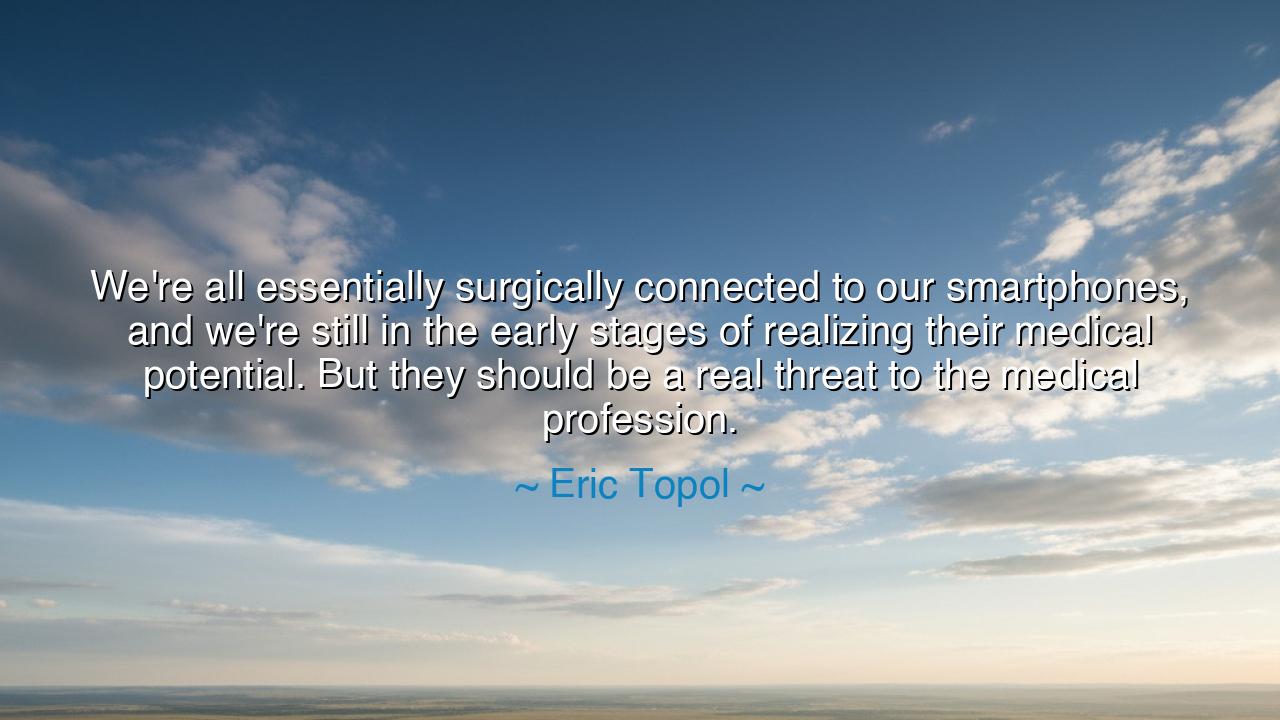
We're all essentially surgically connected to our smartphones
We're all essentially surgically connected to our smartphones, and we're still in the early stages of realizing their medical potential. But they should be a real threat to the medical profession.






The words of Eric Topol—“We're all essentially surgically connected to our smartphones, and we're still in the early stages of realizing their medical potential. But they should be a real threat to the medical profession”—speak with prophetic weight. Beneath their modern phrasing lies an ancient warning about power and transformation, about how tools meant to serve mankind can, in time, change the very nature of those who wield them. In his words, we hear both awe and caution. For the smartphone, once a device of communication, has evolved into an extension of our very selves—a new organ of awareness, an artificial heartbeat of knowledge and connection. Yet as with all instruments of power, its blessing carries within it a shadow: the disruption of old hierarchies and the redefinition of what it means to heal, to know, and to trust.
In the time of the ancients, men once marveled at fire. It warmed, it cooked, it illuminated the night—but it also destroyed. So too now do we hold in our hands a tool of equal magnitude: a digital flame that enlightens but can also consume. Topol’s insight does not speak of fear, but of awakening. He sees that the smartphone has made every human a potential participant in their own medicine. Through sensors, data, and instant information, we can now monitor our hearts, our sleep, our stress, our blood sugar. We are no longer passive patients waiting for the physician’s word; we are becoming guardians of our own bodies. Yet this empowerment, he reminds us, is not without consequence—for it challenges an ancient order of knowledge and authority.
The medical profession, once the keeper of sacred mysteries, now stands at a threshold. In times past, the healer was a figure of both science and reverence, a bridge between life and death. The patient, by necessity, was humble, dependent upon the doctor’s wisdom. But now, as technology democratizes understanding, the relationship is shifting. The smartphone whispers in our pocket, offering readings and data that once required a clinic or laboratory. It brings health into the home, and with it, responsibility. What Topol calls a “threat” is not an attack upon medicine, but upon complacency—the reminder that the age of paternal healing must evolve into one of shared knowledge and partnership.
There is a story from the dawn of another age: when Johannes Gutenberg unveiled the printing press, the scholars of Europe trembled. They feared that the sacred control of knowledge—their monopoly on scripture and study—would be broken. And it was. Books, once chained to monasteries, began to travel into the hands of ordinary people. This revolution in information unleashed both enlightenment and chaos, yet it forever transformed humanity’s relationship with truth. So too does Topol’s quote echo this same transformation. The digital revolution of medicine is the new printing press—placing the book of the body into the hands of its owner. The doctor’s wisdom will not vanish, but it must evolve from that of priest to guide, from gatekeeper to collaborator.
Topol himself, a cardiologist and visionary, speaks not from rebellion but from reverence for progress. He sees in technology the potential for precision, personalization, and prevention—the holy trinity of modern medicine. Imagine a world where diseases are caught before they bloom, where patients understand their own rhythms, where diagnosis is no longer delayed by distance or wealth. Such is the promise of the smartphone as a medical instrument. But he warns us too: the tool is only as wise as the hand that wields it. Knowledge without discernment becomes noise. Data without interpretation becomes confusion. Thus, even as we step into this new era, we must temper our innovation with wisdom, and our curiosity with humility.
The deeper message of Topol’s words is not merely about technology, but about freedom and responsibility. To be “surgically connected” to our devices is both literal and symbolic—we have fused ourselves to our creations. Our minds pulse in sync with our screens. Yet to use this connection wisely, we must not become slaves to it. The ancients taught that every gift from the gods carried a test. Prometheus, who brought fire to mankind, was punished for his gift because humans had to learn the discipline to use it well. Likewise, this new digital flame must be guided by ethics, empathy, and self-awareness. If not, what begins as liberation could end as dependency.
The lesson is thus both modern and timeless: embrace innovation, but do not surrender to it. Let the smartphone be your ally, not your master. Use its power to learn about your body, to prevent illness, to stay informed—but remember that healing requires more than data. It requires understanding, compassion, and connection—qualities no device can replicate. The doctor must learn to share authority; the patient must learn to shoulder responsibility. Together they must forge a new covenant, one rooted not in fear of change but in trust in evolution.
So, my child, when you hold that small glowing device in your hand, remember what it truly is: not a toy, not a tether, but a symbol of your growing power as a being of knowledge. Use it to awaken, not to escape. Let it teach you the rhythms of your own heart, but never let it replace the wisdom of the human spirit. For as Eric Topol foretells, the age of digital medicine is upon us—but only those who wield it with humility and understanding will transform it from a threat into a triumph.






AAdministratorAdministrator
Welcome, honored guests. Please leave a comment, we will respond soon